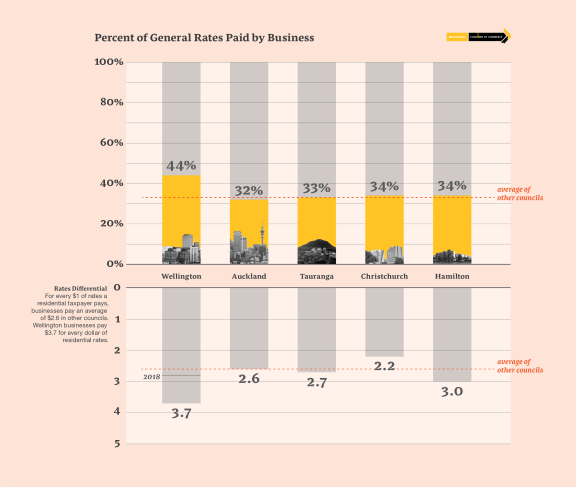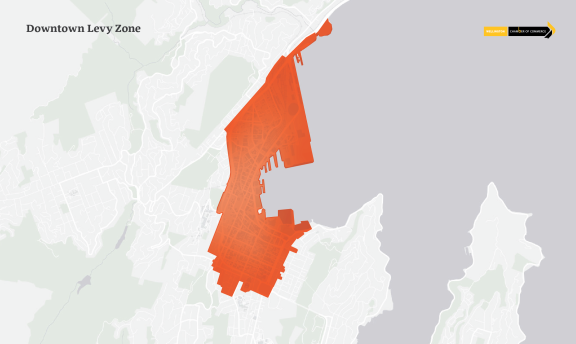
Get in touch
- Phone:
- 04 473 7224
- Email:
- info@wecc.org.nz
- Postal Address
- PO Box 1087
Wellington 6140 - Head Office:
- Level 13, NTT Tower, 157 Lambton Quay, Wellington 6011
A short introduction to the WCC LTP and how it relates to the businesses that make up the city
Council and business are inexorably linked. If business is prosperous, the city is prosperous.
The business sector is critical to the prosperity of the city. Businesses employ people and a vibrant business sector helps attract people to Wellington. Business activity through investment, innovation, and enterprise is an enduring foundation on which the city’s rests.
Today the Wellington City Council released its Long Term Plan for consultation. It proposes an emphasis on investment in infrastructure, with a corresponding 18 percent increase in rates to fund this.
There are a few aspects of concern to us about the rates setting. The Wellington City Council has a strategic goal of Wellington having a “dynamic and sustainable economy”, but proposed business rates will have a disproportionately negative effect on businesses, especially on the small businesses that are what make Wellington thrive.
Commercial businesses currently pay 44 percent of rates in Wellington, which is out of step with the rest of the country. The primary driver of this figure is the 3.7 rates differential applied to all businesses, from your sole trader hairdresser to your bank. It is the highest differential in the country, and a key contributor to the high proportion of rates paid by business.

All businesses in the CBD also pay the downtown levy – a targeted rate paid by only by businesses in this geographic area.

This levy began its life as a voluntary contribution by retail businesses to support initiatives to bring foot traffic into the CBD. The current levy now bears little relation to that original purpose and, while we support this levy existing, we are looking for more transparency on exactly what is being purchased with this $17 million and whether those things represent the best value to the businesses that pay it.
Our main ask is for businesses that pay the levy to have more say in what it is used for.
We want to discuss possibilities for more innovation in the use of this fund beyond broad tourism initiatives. How can we use the $17 million to make the CBD an attractive place to visit for those already living in the region?
Could we fund free public transport within the CBD zone to make it more attractive to shop in the CBD compared with suburban malls? Can we use the funds to accelerate the golden mile upgrades to return foot traffic to those revitalised areas faster?
When coupled with the attitude of some of those on Council towards all businesses – large and small – as a monolith holding back progress in Wellington, we end up with a situation where Wellington business pay an indefensible proportion of Wellington rates compared with other cities and has fewer mechanisms to inform investment decisions.
The result is basic policy and rating settings that undermine the shared vision of a vibrant Wellington characterised by choice and diversity.
A strategy that provides a roadmap (or cycle way) towards a shared vision that allows for businesses to invest and recruit knowing that this Council sees business as a fundamental part of what makes Wellington thrive.
A commitment to undertake a rating review that re-examines the basis for rating policy and how that contributes to the vision for the city, including examining the overall proportion of rates paid by businesses, as well reviewing the ongoing need for:
commercial rates differentials
the downtown levy.
The Council to sell its shares in the airport. We are in favour of establishing a perpetual investment fund for the long-term benefit of the city but ‘the devil is in the detail’ of this. Share sales will provide a pathway for greater investment in Wellington to support the city, as well as to support insurance affordability more broadly by improving the risk profile for the Council.
A formal mechanism for businesses that pay the downtown levy to have a say in its purpose, to support decisions on what it will be spent on, and to be part of the monitoring and reporting to understand the impact of what has been purchased (to inform future decisions).
Approximately 44 percent of the city’s rates revenue comes from its commercial ratepayers. The Council relies on business to contribute directly through rates and levies and indirectly through corporate social responsibility and community participation. The Council’s capital projects and social good strategies depend on the existence of a successful business sector.
Since the Chamber’s founding in 1856, 14 years before the Wellington City Council, there has been a clear and logical conclusion – it is in everyone’s interest that the Council makes business prosperity a central tenet of its strategy and kaupapa.
Take our survey to add your voice to our advocacy work
